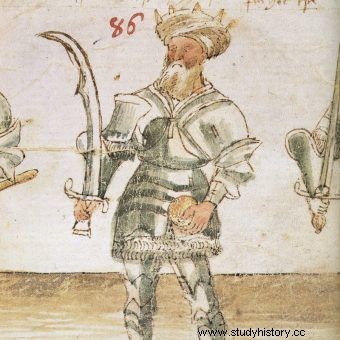
An image of Saladin from a 14th century manuscript.
Saladin (1137 / 1138-1193)
Actually Ṣalāḥ al-Dīn Yūsuf ibn Ayyūb (meaning "righteousness of faith, Joseph son of Job"), also called al-Malik al-Nāṣir Ṣalāḥ al-Dīn Yūsuf I, sultan of Egypt, Syria, Yemen and Palestine, founder of the
He was born in 1137 or 1138 in Tikrica in Mesopotamia (now Iraq). He came from a Kurdish family; his father entered the Zengid service shortly after the birth of his son. Saladin initially leaned towards religious studies, but eventually began a military career alongside his uncle. He participated in expeditions to Egypt where his uncle tried to hold back Christian forces. After the death of a relative, he headed the Syrian army. In 1169, he also became a vizier of the Fatimid Caliphate - after commissioning the murder of his predecessor, Shāwar. Therefore, he was formally entitled to the title of king, but he was commonly called the sultan. In the following years, he strengthened his position, first overthrowing the Shiite Caliphate and replacing it with Sunni Islam, and then gaining independence from the Emir of Syria (1174).
It was not the end of his conquests. By 1186, with the help of efficient diplomacy, supported - where necessary - by military force, he also conquered northern Mesopotamia and Palestine. It expanded under the slogans of holy war (jihad) and the unification of Muslim lands. At the same time, he supported the development of Islamic institutions by funding schools and mosques.
In 1187, having already had a considerable military advantage, he turned against the Franks with whom he had fought only a few less significant battles. In July, he defeated the Crusaders at Hittin, and then quickly took almost the entire territory of the Kingdom of Jerusalem. The crowning achievement of his successes was the capture of Jerusalem on October 2, 1187, after 88 years of Christian rule.
Only Tire, Tripoli and Antioch were not mastered. These cities became a foothold for the members of the Third Crusade, organized in response to the news of the fall of Jerusalem. It was headed by Ryszard the Lionheart and Filip August. Saladin, however, resisted their strength. The truce, signed in September 1192, gave Christians a strip of coast from Tire to Jaffa. Jerusalem remained in the hands of the Sultan. Not long after this final victory, Saladin fell ill. He died on March 4, 1193 in Damascus.
